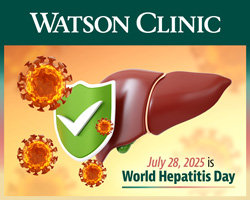
Hepatitis C is a virus that can damage the liver. Here's what you need to know about this infection, and how new treatments may hold a cure.
Hepatitis C begins as an acute infection and causes inflammation in the liver. In some people, it may last just a few weeks before the body fights it off. However, in up to 85 percent of people with acute hepatitis, the illness becomes chronic. That means the virus remains in the body and can last a lifetime.
Over time, and if left untreated, this may lead to problems such as cirrhosis, liver failure or liver cancer.
Hepatitis C is spread through contact with blood. Most people become infected through sharing needles to inject drugs. Before widespread screening began in 1992, many people also became infected through blood transfusions or organ transplants.
Less commonly, the virus can spread through:
- Accidental needle sticks, such as in a healthcare setting.
- Sexual contact.
- Sharing personal items that have come into contact with blood, such as a razor or toothbrush.
- Childbirth—hepatitis C-infected mothers can infect their babies during the birth process.
Hepatitis C often has no symptoms, so a person may be infected for years or decades without knowing it. According to the Centers for Disease Control and Prevention, when symptoms are present, they may include:
- Fever.
- Fatigue.
- Nausea.
- Vomiting.
- Loss of appetite.
- Abdominal pain.
- Dark urine.
- Clay-colored bowel movements.
- Joint pain.
- Yellowing of the skin or eyes (jaundice).
There are several medications available to treat hepatitis C.
One of these, Epclusa, was approved by the U.S. Food and Drug Administration in 2016 and may actually cure the infection. In a clinical trial, 99 percent of people who took the drug showed no evidence of having the virus in their blood after 12 weeks of treatment.